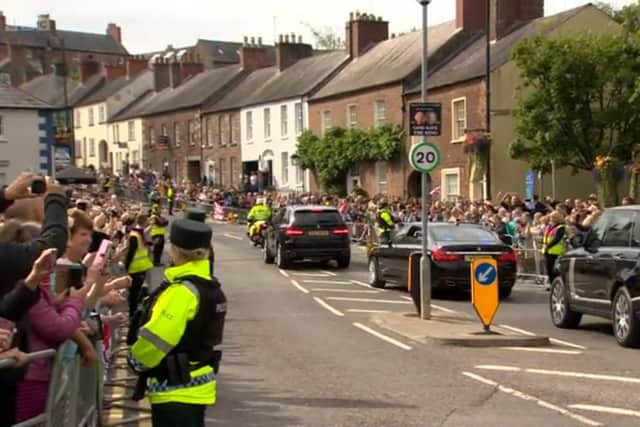Owen Polley: The king’s visit resoundingly affirmed Northern Ireland’s British status


The past ten days have brought the country together in a way that is almost unprecedented.
Across the UK, people lined the streets, not only to show their love for the departed sovereign and express their genuine sorrow, but also to celebrate her life and articulate their support and enthusiasm for the new king.
Advertisement
Hide AdAdvertisement
Hide AdIn Northern Ireland, those who participated in the scenes at Royal Hillsborough and Belfast, or even just witnessed them, will remember those experiences for the rest of their lives.
They were poignant, sad events, because the country had suffered such a loss, but they were also uplifting, as they showed that the monarchy is a source of continuity and certainty for our nation even in the most testing times.
It has become fashionable to imply, because there are stark party political divisions in the UK, that the country is gradually breaking apart.
In the devolved regions, separatists have incessantly made predictions about its imminent demise, revising their targets backwards as each of them is missed.
Advertisement
Hide AdAdvertisement
Hide AdTheir repeated mistake is to underestimate the strength of the emotional and historical ties that bind together the United Kingdom. And one of the institutions that epitomises those links best is the constitutional monarchy.
The late conservative philosopher, Roger Scruton, described the crown as a “light above politics”. He thought that the monarchy, though it was often derided by liberals, provided, “A focus of loyalty that is higher than the nation… an institution that occupies a place in the heart of the ordinary citizen.”
Take away these structures, he argued, “... and you have the mean-minded obsessions of celebrity culture, the American idolisation of wealth or the power cult of the Russian mafia”.
On these islands, the various separatist identities were moulded by their reaction to the dominant political culture, Britishness, and limited by their hatred of that culture. In contrast, the institutions and values that best exemplified the British identity played a key role in shaping the modern western world.
Advertisement
Hide AdAdvertisement
Hide AdThe idea of constitutional monarchy, which has been a moderating and stabilising influence in societies across Europe and beyond, came from these shores.
The powers of the King were first limited by the Magna Carta in 1215 and the monarch has been forced to gain the House of Commons’ assent to tax his subjects since at least the reign of Edward III, a century later.
In Northern Ireland, we celebrate the Glorious Revolution of 1688 and the adoption of the Bill of Rights, which established the first modern constitutional monarchy, under William of Orange.
In the aftermath of Brexit, new divisions transformed UK domestic politics, with voters and activists continuing to define themselves according to the new tribes of Leave and Remain, long after the referendum took place.
Advertisement
Hide AdAdvertisement
Hide AdThe result was an ugly, intolerant atmosphere, with a new caste of elitists deriding the majority of the population as ignorant, or ‘low information’ to use their preferred euphemism.
This attitude is unlikely to disappear completely. But mourning the Queen and celebrating the King’s succession may provide the UK with the powerful shared experience it needs to start healing the scars of the referendum.
It reminds us that we have common references and allegiances that are far more important than domestic political differences. And it may help shake the cynicism and negativity that have recently become so pervasive among many politically engaged people.
In Northern Ireland, it would be wrong to write off some of the gestures that took place last week, however cynical we may be about their real purpose, or to dismiss the idea that the King’s visit was an important staging post in reconciling our society. But that certainly wasn’t its only meaning or the chief legacy it will leave.
Advertisement
Hide AdAdvertisement
Hide AdThis was a resounding affirmation of Northern Ireland’s place in the UK by the Crown, and an assertion of British sovereignty, at a time when unionists badly needed that reassurance due to the protocol. It was also a chance for people to reaffirm their loyalty to the kingdom’s key institutions, without an emphasis on traditions that are upheld only in Ulster.
For that reason, it was a day when the quiet, often unspoken unionism felt by so many people got to raise its voice.
It was welcome that others, even those who come from backgrounds that have traditionally expressed only hatred for the crown, played a respectful role in the events that remembered the late Queen and welcomed the new King.
Their restraint was appreciated.
But this outpouring of grief and love will also remind people who’d become complacent about our constitutional status, or got caught up in the post-Brexit culture wars, of the immense ongoing value of being a full part of the UK.